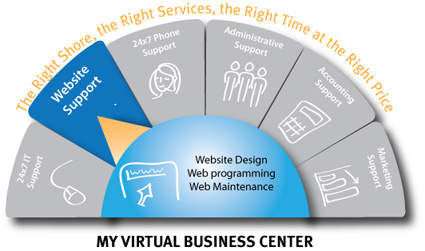

MyBusinessAssistant has always done what we have asked in a timely matter. They are very dependable and knowledgeable. They have been a great service to our business and I would highly recommend them to anyone who is looking for the services that they offer.
Tami AriasFirst Resource Medical Staffing

Shopping Cart Comparison
Choosing a shopping cart platform is one of the most important decisions you make when designing your e-commerce web site. Before you implement a shopping cart on your web site, it’s a smart idea to do your homework and analyze your short and long term business objectives.
Not every shopping cart solution is suitable for every business. You need to think about:
- Business goals
- Your need for scalability
- Functionalities you and your customers may require
- Budget
- Technical expertise or access to someone who
- Expected web traffic
There are four categories of shopping cart platforms or Ecommerce platforms
- Hosted shopping carts
- Licensed shopping carts
- In-House shopping cart development
- Open Source shopping carts
Below find a summarized comparison chart of the different ecommerce shopping carts platforms:
Shopping Cart |
Hosted |
Licensed |
In-House Development |
Open Source |
| Setup | Easy | Intermediate | Advanced | Advanced |
| Cost | Low | High | Very high | Variable |
| Customizable/Flexibility | None | Limited | Complete flexibility | Complete flexibility |
| Technical Expertise | Minimum | Average | Highly experienced | Highly experienced |
| Best candidate | Start-up and small ecommerce businesses. | Medium to large ecommerce business | Very large and multinational ecommerce businesses. | Serious commerce businesses that plan to grow. |
| Serious commerce businesses that plan to grow. | No need for installation or configuration.Shopping cart is ready to be used by you. | Ready-made shopping cart that you own with some flexibility in the feature customization. | Highest level of flexibility and control needed to customize it to your business needs. | Flexible solution that is free.Completely and highly customizable. |
| Major disadvantage | No control on adding or changing any feature. Business does not own anything. | Special feature or enhancement will depend of provider.Could be very expensive. | The most expensive option with the need of a highly experienced technical team. | Support might not be available and highly experienced technical team is required. |
Hosted shopping carts
Easy to set up and Low operational cost:
Advantages:The greatest benefit of a hosted shopping cart solution is that you won’t need to install or configure the shopping cart yourself in house because all frontend and backend systems are installed by the hosting shopping cart provider and almost ready to be used by you. The hosting provider is responsible for maintaining its infrastructure, creating automatic backups, securing transactions and transaction processing, providing credit card payment facilities, all software updates, and providing maintenance and tech support so your online operations run without hassle.
Drawbacks: Hosted solutions are like renting a house to live instead of buying it or building it. In other words, you are renting a shopping cart and all the features that come with it for a monthly subscription fee. You or your business doesn’t own anything. If you decide to leave the provider, you start everything again from scratch. Another big drawback is you are at the mercy of the provider as to what all features it provides. You have no control on adding or changing any feature. You are bound by the terms and conditions of the hosting company. In short, you enlist a third party to control your ecommerce business to a large extent. So, if you planning for a rich and customized features and high growth ecommerce business, hosted solution is not the right way to go.
Best for: Start–up and small ecommerce businesses.
Licensed shopping carts
Limited customizable software that you own:
Advantages: You may get a good shopping cart product that you own. In other words you buy the license to own and use a readymade shopping cart software for your Ecommerce business. They come in different price range. You take the product, host it and integrate with other applications if required. You simply download your licensed software from your vendor’s web site or install it on your server from a CD for a one-time fee. You can now customize your shopping cart features and functionality to fit your needs. Licensed shopping carts are a good solution for your e-commerce website provided you or someone else has the technical expertise to perform install and customization. Like any other licensed software, the provider takes the responsibility of upgrades and patches. Some providers may also take care of the maintenance for an annual maintenance fee.
Drawback: Most licensed shopping cart software could be pricey. The most important part is you own only the product but not the source code of the product. Therefore, for any special feature or enhancement you will still depend on the software license provider. Make sure you have technical infrastructure to host the product. When you determine the total cost of your licensed software purchase, be sure to factor in the cost in time for installation, customization and employee training. It’s a big expense, so do the math before you buy.
Best for: Medium to large e-commerce business with a technical infrastructure and support team, but not wanting to invest a lot of time in the process.
In-house shopping cart development
Advantages: This is like building a house from scratch. Since you are building it this gives you the highest level of flexibility and control you need to completely customize it for your business. Developing your shopping cart in-house means you maintain total control of the process and the final product: a well-scaled platform that suits your specific business needs without lots of extraneous source code.
Drawbacks: This could be most expensive option among all four options. You need a highly experienced technical workforce to develop and maintain it. The cost and risk involved in in-house shopping cart development, coupled with the time it takes to build a good product, makes this option prohibitive for even many larger ecommerce companies, so tread carefully.
Best for: Very large and multinationals businesses with a considerable budget for customization on highly specialized features that are currently not in the market.
Open source shopping carts
Advantages: Flexible solution that’s free to download. The open source approach to the design, development and distribution of software has made it possible for virtually every company to build a highly customized shopping cart that they own the product as well as the source code.
Like the licensed shopping carts, there are many of open source shopping carts or Ecommerce platform you can choose from and you can customize your and revise your cart functionality, provided you (or someone on your staff) has the know-how. The difference between licensed shopping carts and open source shopping carts is cost: there is no cost to download open source applications. However, the costs depend on the work involved in your cart’s customization and testing.
Benefits of open source shopping carts include:
- Open source shopping carts are, well, free: there are no download or installation costs. Some web hosting companies even offer one-click install scripts on their servers in case you need to download their shopping cart.
- Open source shopping carts are completely customizable: You could even develop completely new shopping cart software using the code of an existing open source shopping cart.
- Open source technology is supported by a helpful, highly motivated community. There are hundreds of forums and blogs dedicated solely to helping the open source community. Chances are if you have an issue, there’s someone out there who can help.
- Commercial support is available if you need it. Many organizations save money by selecting free source shopping carts and then hiring a highly specialized programming team to perform customization.
- New versions of open source shopping carts are free and frequent. Because open source software is constantly evolving all over the world, new versions of software are rapidly made available.
Drawbacks: There are several disadvantages of building a shopping cart from open source software. Sometimes free support is not available, and commercial support can be more expensive than the support available with commercial software. Also, round the clock support is not always available in case of emergency, so you run the risk of expensive downtime. But if you have your eyes open and a back-up plan ready , an open source shopping cart is an ideal solution for your small to medium size ecommerce businesses, provided that you partner with a reliable and knowledgeable business support company.
An open source shopping cart not only saves you money, it can grow and evolve with your business while keeping your monetary costs to a minimum.
Best for: Serious ecommerce business that plan to grow, want to own and have complete flexibility in the development of their platform, with the support of technical team.








